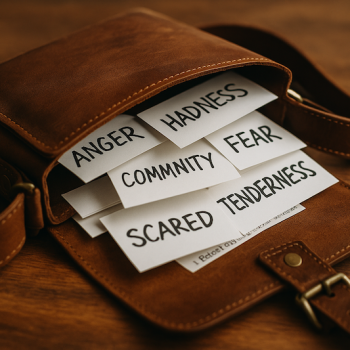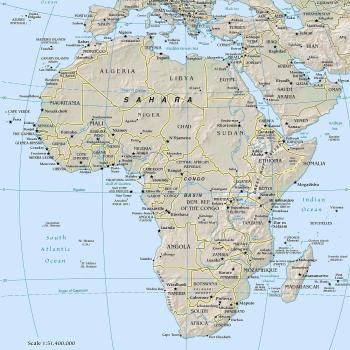The truth, I believe, is just the opposite. That sense of unity is not the illusion. Rather, it is the sense of disconnectedness that most of us walk around with every day that is false. The connection is the truth. It is a window on the spirit, and it is holy. As children of God, we are connected, and if art reveals that to us, even if it is secular art, it contains an element of the sacred. The arts can reveal certain kinds of truth in ways that our loftiest ideas never can.
The mysteries of just how this happens and what it means also point to God. We don't understand because it is beyond our understanding. That's hard for people like me who tend to think that our thinking will show us truth. All of my best thought, though, does not explain the power of art, or the nature of God. What I understand is that I don't understand, but there is something here that I want to stand closer to. The arts have a way of embodying that mystery, and therefore pulling us back from the dangerous and seductive illusion that we understand God, that we know the rules and that those rules are sufficient. They are not.
We need the arts in worship because they are imaginative, and we need imagination in order to transcend the boundaries of our limited intellects and the tendencies of many of us toward self-defeat. As theologian Walter Brueggemann writes in his book The Prophetic Imagination, "The prophet does not ask if the vision can be implemented, for questions of implementation are of no consequence until the vision can be imagined . . . We need to ask not whether it is realistic or practical or viable but whether it is imaginable." We need vision, the sense of where we're headed, even if we remain far from our goal, and the arts are uniquely useful in the effort to envision.
To participate in creative endeavors is to answer an implicit call from God. Creation is not something that happened a long time ago and ended, but an ongoing process in which we are invited to participate. There are new daffodils bobbing in the breeze outside my window as I write this that didn't exist a month ago. Certainly, their component elements were in the world, but this flower was not here. Creativity is the natural flow of things, and resisting that creativity takes energy. Likewise, there are relationships in my life that have come into existence only in the last few days—people I have never known before, and now I am beginning to. Those intersections between lives matter. What we create together is significant. To sing together in church has the potential to create a moment of harmony and unity that has never existed before. We are invited to be involved with the process of creating the world, and when one receives an invitation like that, it is important to R.S.V.P.
In the end, though, the most compelling reason I have for believing in the importance of art to the church touches on extremely personal experiences of art. I referred above to times when music has the capacity to midwife a moment where everyone in the room seems to somehow melt together in a kind of spiritual communion. I have had the privilege of experiencing those kinds of moments as a performer as well as an audience member—times when the song ends and no one in the room can bear to make a sound; there is no applause because no one wants to profane the silence. How did we decide together, hundreds of people in a room, that no one would clap? There is a connection there that is beyond any explanations I have encountered.
What is fascinating to me, though, is how one feels leaving the stage on a rare night like that. I have sometimes walked to the green room and wept alone, feeling deeply honored and humbled to have been a part of it. That's just the opposite of what one might expect, and I write it here not to claim that I am a particularly humble person (there have been plenty of other nights when I have left the stage completely full of myself, to be sure!). But on those holy nights I have described, when spirit moves, humility is the only natural response. It is abundantly clear to the performer that he or she is not the Light, but has been privileged to be the lens that the Light passes through, focusing it in this time and place. When that happens, it is clear to you as the performer that you didn't do it. Something much bigger was moving. Like seeing a baby born or holding the hand of a dying friend, the door opens for a moment and we glimpse the divine.
And that is why the arts are fundamentally important to the church and its work. We need to feel as well as to think, to be invited into dialogue with God, to remember our connection, to answer the call to create as well as to be created, to envision and imagine, and, at every opportunity, to glimpse the divine.
Related Articles:
"The Biblical Imagination," by Michael Card
"Praying with Art: Visio Divina," by Tim Mooney
"Sacred Artists Speak," by Tim Mooney




